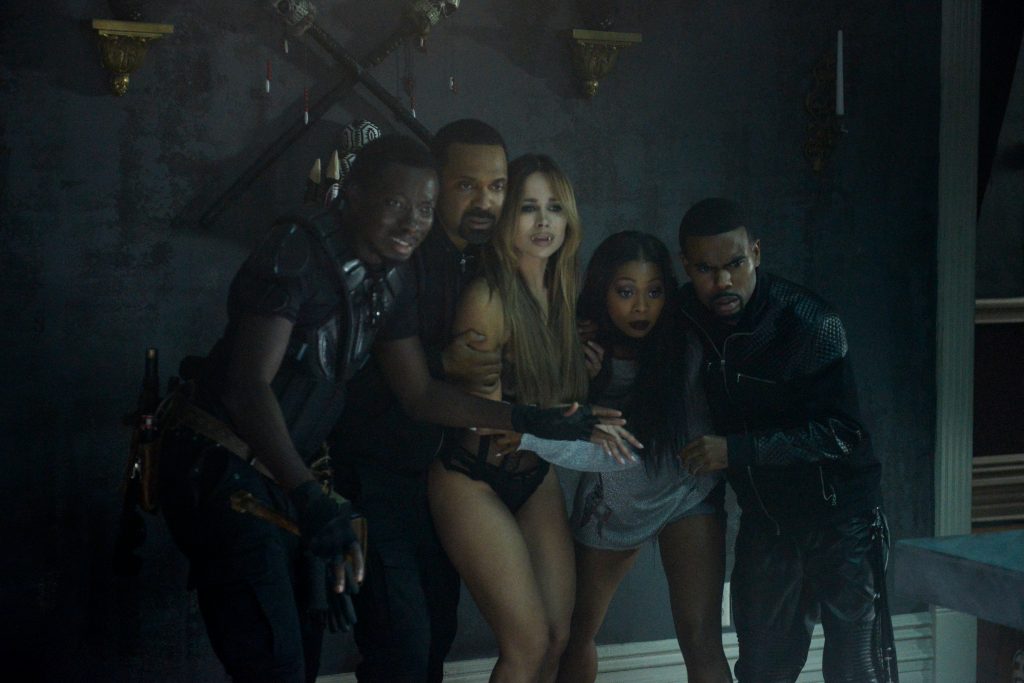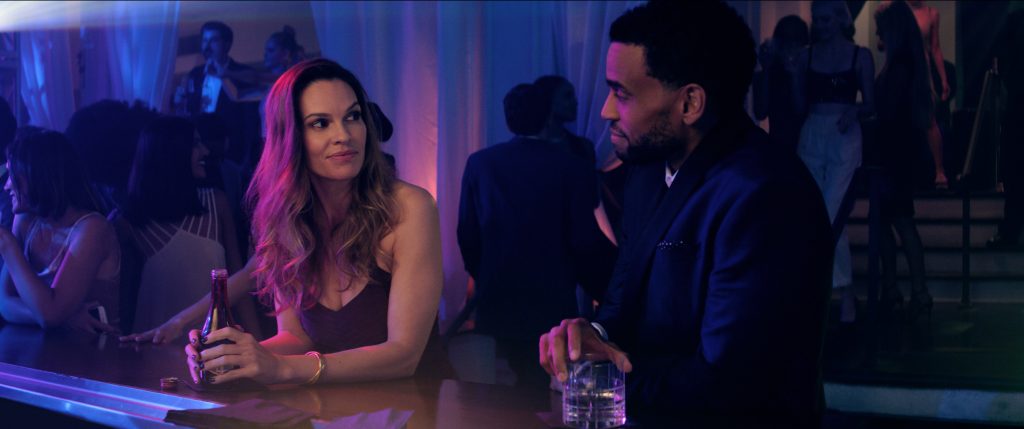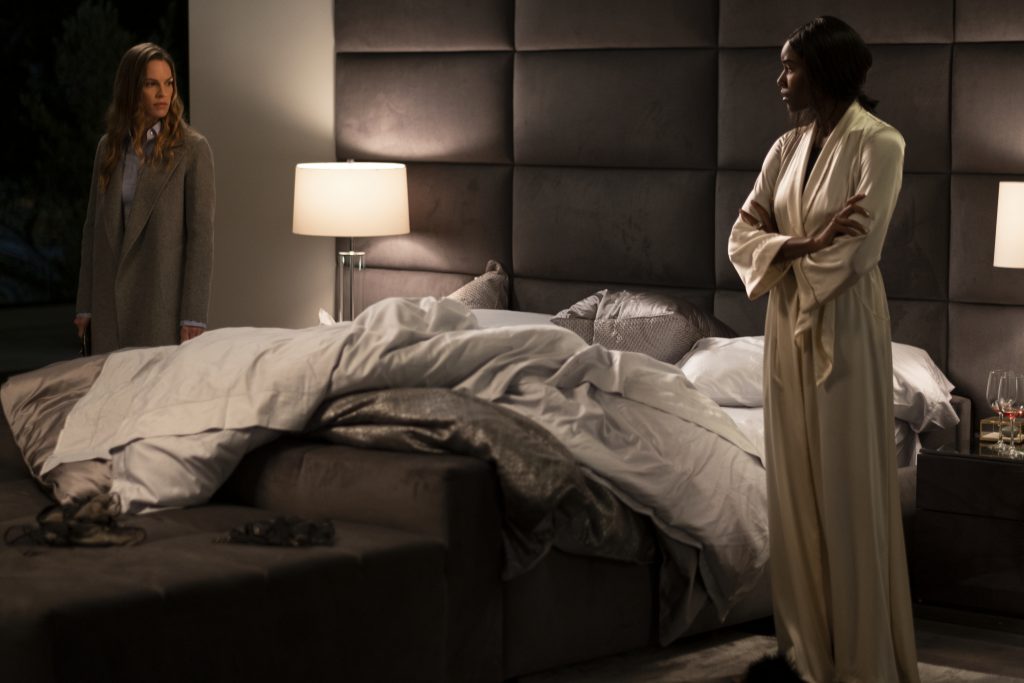February 13, 2023
by Carla Hay
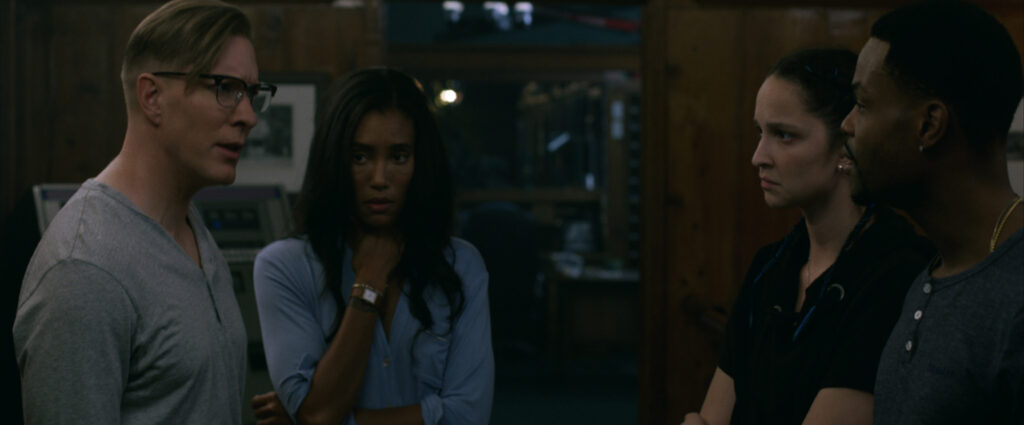
Directed by Deon Taylor
Culture Representation: Taking place in 2020, primarily in Kyburz, California, the horror film “Fear” features a cast of predominantly white and African American characters (with a few Asians and Latinos) representing the working-class and middle-class.
Culture Clash: A group of friends gather at a remote lodge to celebrate one of the friend’s birthday, and their worst fears become a reality when they find out the lodge is cursed.
Culture Audience: “Fear” will appeal primarily to people who don’t mind watching horror movies that are bad in every single way.
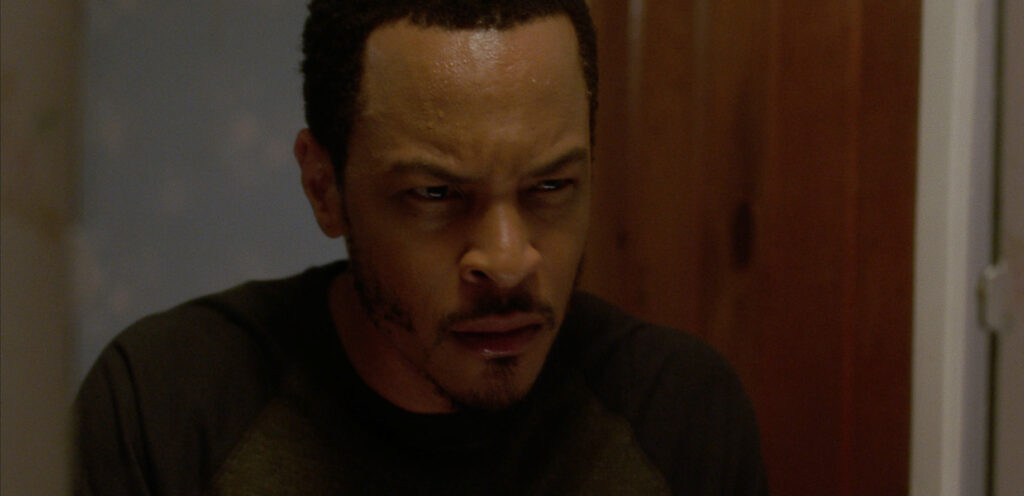
With a COVID-19 pandemic theme, the horror flick “Fear” is an idiotic time waster with a muddled story, tacky visual effects and weak ideas that are ripoffs of better-made horror films. Avoid this boring junk. Although there are a few fairly well-known entertainers in the movie’s cast, that star power isn’t enough to save “Fear” from its utter stupidity.
Directed by Deon Taylor (who co-wrote the atrocious “Fear” screenplay with John Ferry), “Fear” is yet another horror movie about people stuck in a remote location while terror is inflicted on them. In the case of “Fear,” this remote location is the fictional Strawberry Lodge in Kyburz, California, which is in the Lake Tahoe area. A group of nine people have gathered at the lodge to celebrate the birthday of woman in her 30s named Bianca (played by Annie Ilonzeh), who has a Ph. D. in religion.
Bianca’s boyfriend Rom Jennings (played by Joseph Sikora) has arranged this gathering as a surprise for Bianca. Rom is an author whose specialty is writing books about the paranormal and the unexplained. The movie opens with Rom doing a TV interview, where he says that he’s working on his next book, which will be about “the mythology of the Americas.”
Rom says of his forthcoming book, “I can’t really tell you too much about it, but what I can say is that is does squarely focus on the mythos and the mythology surrounding fear and the concept of fear.” He adds that he’s researching an area in Northern California that “permeates fear.” Rom then makes this obvious statement: “Fear is very real.”
During Rom and Bianca’s car drive to the Strawberry Lodge, they’re listening to the radio and hear a news report about Angel Wilson, a woman who disappeared from the Lake Tahoe area in 2015, when she was 26, and she is still missing. Bianca asks Rom to change the radio channel. It’s at this point you know that Angel will be mentioned several more times in the movie.
The seven friends of Rom and Bianca who have gathered to celebrate her birthday have mostly generic personalities in this poorly written movie. There is barely any information given about them, such as what they do for a living or how they know Rom and Bianca. The lodge has been rented so that these friends can have the place all to themselves. (How convenient for a horror movie.)
The other people in the group include Michael (played by Iddo Goldberg), a Brit who is Rom’s agent. Lou (played by Tip “T.I.” Harris) has been Rom’s friend since they were in eighth grade. Accompanying Lou on this trip is his girlfriend Kim (played by Tyler Abron), who is a single mother to an underage son.
Benny (played by Andrew Bachelor, also known as social media personality King Bach) is a photographer and the most inquisitive and talkative person in the group. Two other friends are a dating couple named Russ (played by Terrence Jenkins) and Meg (played by Jessica Allain). Another person in the group is Serena (played by Ruby Modine), who is superstitious and wears a “lucky” necklace with her at all times.
Rom has told Lou and Russ that he wants to propose marriage to Bianca, but so far (including during the trip to Strawberry Lodge), Rom got scared and couldn’t go through with his marriage proposal. It’s mentioned that this is the fourth time that Rom has failed to propose to Bianca. This marriage proposal is mentioned so many times, you’d think it would be a buildup to a big part of the story, but it isn’t.
Upon arriving at the lodge, the guests are greeted by a creepy hostess named Miss Wrenrich (played by Michele McCormick), who says that her family bought the lodge and rebuilt it after the lodge burned down in 1853. The lodge was originally built in 1838. Later, through research on the Internet, Benny finds out that the area has a sinister history of a group of witches calling themselves Las Brujas, who defended themselves against criminal Gold Rush miners, who would kidnap, rape, and sometimes kill women in the area.
Miss Wrenrich takes Bianca’s hand and says to her: “You carry the light, my dear. You’re a beacon.” This movie isn’t subtle at all about who’s most likely to survive the murder and mayhem that will ensue. Before she leaves, Miss Wrenrich insists on taking a group photo of the guests. She uses a Polaroid camera.
The COVID-19 pandemic is mentioned several times in conversations, although no one is social distancing or wearing masks. Because no one in the movie mentions being vaccinated, the movie appears to take place in 2020, before a COVID-19 vaccine was available. It’s mentioned briefly that Michael asked all of the guests (except for Bianca, since this gathering was a surprise to her) to take COVID tests before coming to the lodge, and all they all agreed. However, several of the guests become paranoid because Lou has been coughing frequently. Lou gets defensive when he finds out that some of the people in ths group suspect that Lou might be infected with COVID-19.
While gathered outside around a small bonfire one night, the friends confess their biggest fears. And it’s at that moment that you know that their fears will happen at some point in the movie. Bianca’s biggest fear used to be losing her religion, but more recently, her biggest fear has been losing the ability to breathe. Serena, who had a traumatic car accident when she was a child, says her biggest fear is losing control.
Russ says his biggest fear is blood. Kim says her biggest fear is not being able to take care of her son. Meg can’t swim, so her biggest fear is drowning. Lou says his biggest fear is not being trusted, especially by the people who depend on him. Benny was once handcuffed in a police brutality incident, so his biggest fear has anything to do with cops and handcuffs. Rom says his biggest fear is losing Bianca.
The rest of “Fear” has nothing but dull and not-very-interesting jump scares. As for the missing person Angel Wilson, who is mentioned numerous times in the movie, that’s a subplot that is badly mishandled and ends up being worthless. “Fear” is also completely worthless if people are looking for an entertaining horror movie.
Hidden Empire Film Group released “Fear” in U.S. cinemas on January 27, 2023.

